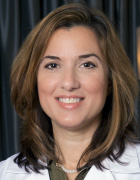How NCH helps moms after childbirth
April 17, 2019
Isolation + sleeplessness can equal PPD
Q & A with OB/GYN physicians Lorraine Novas, M.D. and Jill Placek, M.D.

Many mothers develop postpartum depression (PPD). What’s in place at NCH to help them?
Dr. Novas: When a patient appears to be in need of more emotional support or might have some risk of depression, we encourage them to get therapy with a counselor, attend support groups for new moms, see a psychiatrist for medication, or perhaps an OB/GYN might prescribe an antidepressant.
We screen postpartum patients using the Edinburgh Scale. We collect a history on the mother. If she has suffered from PPD before, we know that she’s at risk. Anyone who is considered at risk is seen by a social worker. Anybody who seems depressed to the doctor or nurse, is a single parent or a parent with other issues, a social worker will see that person and connect them with services that are available.
Dr. Placek: NCH physicians and staff are trained to help identify and help women access treatment options that can be in the form of medication management, counselor/therapy interventions, new mom and/or PPD support groups and, in some circumstances, psychiatry and psychology interventions on both an inpatient and outpatient basis.

A patient can access these services by contacting her provider, ancillary staff including social services, or by contacting the hospital directly through NCH’s website or calling the hospital directly for assistance at 1-847-HEALING.
What if a new mom is at risk of hurting herself?
Dr. Novas: This is a very serious disease with many causes. Anytime a woman is experiencing feelings like that, we need to lift her guilt and get her help.
Dr. Placek: Unfortunately, some women do struggle quite seriously with symptoms of depression giving them unwanted thoughts or feelings of hurting themselves or, in rare cases, harming others. Help is here. Don’t wait. Contact your doctor and/or go immediately to Northwest Community Hospital’s Emergency Room for immediate assistance. Depression hurts, but we can help.
What is your impression of the new PPD IV drug approved by the FDA last month?
Both: New medications and treatments are constantly being discovered to treat a wide variety of conditions. This new IV medication is one of them. Patient trials have been reassuring leading to FDA approval of this medication. It is new and as such it’s still early to tell what kind of impact this will have in the long run on how we treat postpartum depression.
Can you describe how and for whom this new drug is administered?
Dr. Novas: It’s an IV medication administered for three days in an inpatient setting. You cannot do it as an outpatient and like many new drug regimes, it’s currently very expensive. It’s for someone who just can’t wait for therapy to work, or wait two to six weeks for a typical antidepressant to work.
Dr. Placek: At this time, insurance approval and cost, in addition to logistics of an inpatient admission for new moms, is a challenge. As with all newly approved medications, administration protocols and use will likely change as even more information becomes available.
What is the best care for most women who suffer from PPD?
Dr. Novas: There are so many things moms can do to be proactive and to feel better emotionally, such as exercising regularly and taking certain antidepressant drugs that are safe during and after childbirth. A diet high in omega-3 fatty acids – fish, nuts and eggs – has protective effects, and learning coping techniques helps, too.
Dr. Placek: “Best care” is different for everyone, but for almost all, avoiding isolation is key. Reaching out to friends, family, other moms, spiritual leaders, and of course, your healthcare team is crucial. Though PPD is common, it is not normal and no woman should struggle in silence.
What are some commonly occurring problems that make PPD worse?
Dr. Novas: Sometimes the lack of sleep can change your emotional health. There are things you can do to help with sleep during pregnancy, such as eating milk and turkey, which contains tryptophan and can aid with sleep. Melatonin also may help.
Dr. Placek: A woman after delivery, regardless of whether she is taking care of a newborn, has lost a baby, has a baby in the neonatal ICU or has chosen adoption for her child goes through incredibly strong changes in hormones, dietary habits and sleep patterns in addition to the psychological stress of her own situation. Sleep deprivation, inadequate nutrition and isolation, though common characteristics among all new moms, exacerbate symptoms of depression.
What stops many women from seeking the help they need?
Dr. Novas: Women are often afraid to take antidepressant medication because they’re pregnant or breastfeeding. I would like to reassure women that there are a lot of safe medications available. It’s always better to be happy and unstressed when raising your baby because your health, including your mental health, is so important.
Dr. Placek: Some women are afraid of the stigma of mental health. As a society, we are getting better with shedding more light on this incredibly common issue, but we have a long way to go. Some women do not know where to go to get help. Some women simply do not realize they experience symptoms of depression. Your doctor and NCH staff can help navigate these common barriers.
Do you have any other advice?
Dr. Novas: I think women should be aware that being a stay-at-home mom can be isolating. Also, the idea that one person is solely responsible for the baby 24/7 is a lot of pressure. Yet there’s a misconception that a mom who stays at home with baby should be able to accomplish all these other things – cleaning, cooking, shopping and feeding the baby. In reality, that’s more than a one-person job.
I also want to encourage mothers that they shouldn’t feel inadequate because they didn’t have a vaginal delivery or couldn’t breastfeed. Not everyone can have a vaginal delivery and some babies aren’t good at breastfeeding. You don’t have to feel like you’re a failure.
Depression can be anger turned inward. Many women are angry that they’re not perfect. PPD can be caused from trying to do all that’s expected of us.
Keep in mind that this is a big thing for your body physically, emotionally and financially. It’s time-consuming, expensive, exhausting and hard to do even with support. We spend time on our careers and nurturing all sorts of things. We need to nurture and protect our emotional health as well.
Dr. Placek: Being a new mom is hard. There is no rule book on how to heal from delivery and navigate this new chapter in life. Whether you are parenting one child or twenty, whether you have chosen adoption or have lost a little one, there is no one correct path. It is alright to not know the answers and sometimes even the questions. We’re here to help you sort through it all. Call your doctor or your pediatrician. We’re here to help.
Drs. Novas and Placek deliver babies at NCH and practice at 1614 W. Central Road, Suite 205 in Arlington Heights. Expecting a baby or need OB/GYN services? Call 847-392-9191 to schedule an appointment.